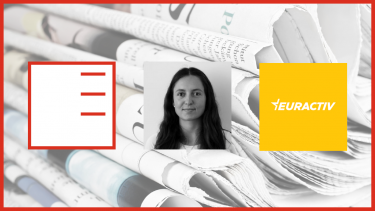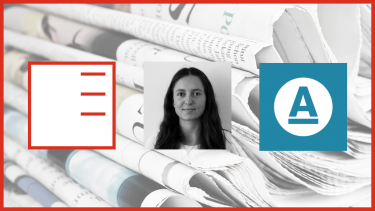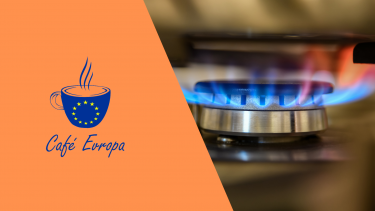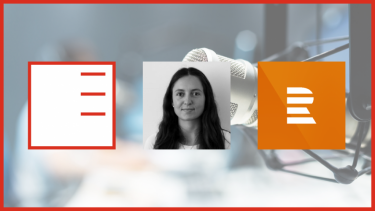iRozhlas: 'Fresh' first month of the presidency. The Union is relieved that the Czechs have negotiated even a problematic point like gas
In their article on the current European energy policy, iRozhlas.cz refers to the study Gas in Numbers - European solidarity with gas: where does the Czech Republic stand?, which was prepared for EUROPEUM by our researcher Michal Hrubý. Michal Hrubý also commented in more detail for iRozhlas on the necessity of building energy independence from Russia, reducing annual consumption and Czech interests.
Show moreGas in numbers | European gas solidarity: where does the Czech Republic stand? | UPDATED
European Union countries are facing a period of gas consumption cuts. Although the proposal agreed by Member States aims for a voluntary reduction of 15% in consumption in the coming months compared to the average of the past five years, the pressure for even greater savings will grow. And not only in natural gas consumption, but also in electricity. Our researcher Michal Hrubý has written an overview of gas and its use in the Czech Republic, in which he highlights the need for savings to help us get through this year's heating season and answers several questions related to gas consumption. Where does the Czech Republic stand on gas? What are our supplies and where to get new capacity? And how can we save for next winter? These questions are also answered in the review. We will update the overview gradually (originally published on 1 August 2022).
Show moreČRo Plus: The European Union is preparing joint gas purchases. The summit has not yet produced an agreement on how to lower prices.
Our research fellow Zuzana Stuchlíková commented on the ongoing negotiations on the European summit to help further joint action towards Russia and European energy independence. What will the energy crisis mean for the incoming Czech presidency?
Show more
Politico: Czech Republic braces for rocky EU presidency amid Ukraine war, high inflation
The head of our Brussels office, Žiga Faktor, commented for the news website Politico on the approach of the Czech government and the attitude of the Czech electorate towards the upcoming Presidency of the Council of the European Union.
Show more
EURACTIV: Union looking for LNG supplier. EU pinning its hopes on the Gulf
Our researcher Kateřina Davidová is quoted in a EURACTIV article on LNG. According to Kateřina Davidová, the new EU strategy represents a shift in the "right direction".
Show more
INVITATION: Implications of the Russian Invasion of Ukraine for the Western Balkans: Challenges and Options for the Czech Presidency
The EUROPEUM Institute for European Policy, the Balkans Policy Advisory Group (BiEPAG) and the European Fund for the Balkans (EFB) invite you to a public conference on the Balkans and its politics at the event entitled: Consequences of the Russian Invasion of Ukraine for the Western Balkans: Challenges and Opportunities for the Czech Presidency. The debate will take place on 11 May 2022 at 18:30 at Impact Hub K10, Koperníkova 10, Prague 2 - Vinohrady, 120 00.
Show more PDFAktuálně.cz: How to reduce dependence on Russia: Europe and others tackle gas, oil and coal cuts
Our researcher, Kateřina Davidová, commented for Aktuálně.cz on the latest package of sanctions against Russia by the European Union. According to her, the biggest impact on the Russian economy would be the restriction or ban on the purchase of mineral resources from the largest European customers or even from the whole European union. The best alternative to these energies would be to switch to renewable energy sources, says Kateřina Davidová.
Show more
INVITATION: Café Evropa online: The future of European energy - how to ensure stable and clean energy sources without Russia?
We would like to invite you to the Café Evropa debate on 21 March at 17:30 on the topic "The future of European energy - how to ensure stable and clean energy sources without Russia?". The Russian invasion of Ukraine has, among other things, further fuelled the question of energy security in the Czech Republic and the EU and the future of energy in our country. The current security situation points to the need to diversify energy sources as soon as possible, i.e. to secure energy supplies from different regions and countries in order to avoid excessive dependence on Russia. There are also views in the public debate that coal extraction could be temporarily increased, which would enable some countries to cover any shortfalls in resources. Is a complete or even partial halt of Russian gas supplies to the Czech Republic and the European Union a realistic option? What impact would this have on our energy security? How much further increase in energy prices can we expect in this case? How should EU countries react and help households and industry cope with the expected increase? Could a possible temporary increase in coal extraction mean a return to fossil fuels and the end of the EU's climate ambitions? Or could the current problematic situation further accelerate the energy transition?
Show moreČro Plus: Priorities of the French Presidency and meeting with the V4
What can the upcoming French Presidency of the Council of the European Union mean for the Czech Republic, especially given that it will be immediately followed by the Czech Presidency? Can it be assumed that France and the V4 countries will converge on energy issues and move away from, for example, Germany, which is striving for nuclear-free and carbon-free energy? Does nuclear energy have the potential to become green energy for the French? How do France and the V4 countries need or not need Nord Stream 2? These and other questions were answered by analyst Kateřina Davidová on Czech Radio.
Show more
INVITATION: EU-PACIFIC Talks: EU – Japan Strategic dialogue: climate change cooperation as a pathway to the future
We would like to invite you to the third of six debates in the EU-PACIFIC Talks series. The debate will take place online on Wednesday 1 December at 18:00 and you can watch the online stream on our Facebook page.
Show more
Staroměstské náměstí 4/1
Prague 1 - Staré Město
110 00
tel.: +420 212 246 552
email: europeum@europeum.org
https://www.europeum.org









